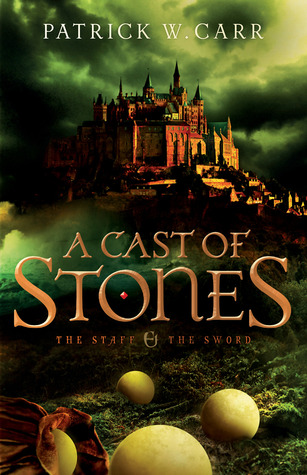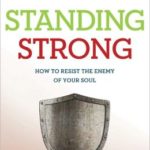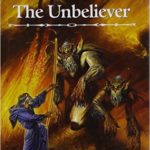Unlocking The Theme Of A Cast Of Stones
I’m not even sure I could have told you the theme of my first series, “The Staff and the Sword,” even after the last book came out. But I can tell you that I started the first book, A Cast of Stones, and set it aside for three years because I didn’t have a theme.
I could have told you the plot: Orphan kid makes good by the grace of God.
I could have told you the inspiration: I wanted to write an epic fantasy that was an allegory for the life of Christ using an earthly model of the trinity. (Yes, I really did mean to do this.)
 I could even have told you, in my more transparent moments, that I never expected A Cast of Stones to get published because I wrote it as an exercise inspired by the “Harry Potter” series. I wanted to see if I could write an entire novel in an epic fantasy from the viewpoint of a single character. You have no idea how badly I wanted to introduce a second point of view character during the first draft, but I knew the discipline I’d have to cultivate by telling the story from only one point of view would stand me in good stead.
I could even have told you, in my more transparent moments, that I never expected A Cast of Stones to get published because I wrote it as an exercise inspired by the “Harry Potter” series. I wanted to see if I could write an entire novel in an epic fantasy from the viewpoint of a single character. You have no idea how badly I wanted to introduce a second point of view character during the first draft, but I knew the discipline I’d have to cultivate by telling the story from only one point of view would stand me in good stead.
I did all of this and more. There are layers of symbolism built into The Staff and the Sword series that most people will never consciously realize are in the story. I say consciously, because I believe that that art of story works on more than just the conscious level. I trust and hope that the symbolism I wove into the fabric of the story will tug at readers’ hearts so that they will come back to it over and again, even if they’re not sure why.
I spent hours searching for the right mix of names to go with carefully crafted personalities and extensive backstories so that I could write about my characters as if they’d been personal friends for most of my life. And like a lot of writers, I worked some scenes over and over, trying to find just the right words to convey the tone
But theme?
What?
It wasn’t until later that I realized I had been writing the story from a central theme all along. When I first joined a writers’ group here in Nashville about seven years ago, one of the craft books that was recommended to me was Stein on Writing. I bought a copy and quickly read it from cover to cover, though not in chapter order. Many chapters were so instructive that I would immediately re-read them with a highlighter in hand to mark the best spots.
One chapter that struck me was quite short, no more than four or five pages perhaps, but it described a technique that Stein referred to as “the secret snapshot” where he asks writers to picture a snapshot of their deepest secret. Understandably, I was discomfited, as many of you might be, and this was in the privacy of my own home without an audience.
But the more I thought about that chapter, the more the truth of it and its transparency struck me. The fallen human condition means that most of us, if not all of us, have certain incidents in our past, be they thoughts or actions, that we hope never see exposure to the light of day. Yet, they will. Our faith tells us they will.
It was when I realized this that A Cast of Stones, a novel that I had shelved years previously because I just couldn’t get the story to come alive, finally found its groove. I took a post-it note or a sheet of paper, I can’t remember which at this point, and I wrote on it:
Everyone has secrets
And I kept that note in front of me for the entire series. When characterization and plot started to flag and I couldn’t bring life to the characters as they came into the scene, I would look at that note and I would ask myself the following questions:
“What are they hiding?”
“What secret are they desperate to keep secret?”
Voila! I had a theme without even knowing that’s what it was, but that idea permeates every major and minor character within A Cast of Stones and its sequels. When it came time to set aside that world and craft a new one, I instinctively knew where I needed to begin. I’d already decided that I would have another deeply flawed hero, this time on the inside rather than the outside. But I needed more. I’d learned that my theme was the glue that held my story world together and gave it resonance with the reader.
So I began the search. But what to use? I mean, I really liked my previous theme. I liked it so much that I wanted to use it again, yet within that desire lay a trap. I risked writing the very same story. I’m not saying it would have been bad. There have been writers I have loved who really only had one story they wanted to tell and they made a lot of money telling it over and over again.
 But I didn’t want to do that. I wanted to write something different. So I hit upon a different theme for my series and its first episode, The Shock of Night.
But I didn’t want to do that. I wanted to write something different. So I hit upon a different theme for my series and its first episode, The Shock of Night.
“Minds are broken”
As it turned out, this new theme allowed me to work into my story a cast of characters I’d been trying to use for a while. My experience as a teacher has brought me into contact with wonderful students and parents, many of whom are gifted with minds that don’t perceive the world in the same way most people would classify as “normal.” My theme gave me the creative push to not only give these characters a voice, but to make them heroes as well.
With one novella, two novels, and a work-in-progress on the ground, I can say with satisfaction that my theme is doing its job. It’s giving me the creative focus to bring my story together.










































Thanks for this “behind the scenes view”, Patrick! I find it interesting that you couldn’t continue your trilogy until you had hit on a theme. For me, the process was in reverse. I wrote the first draft, and then discovered the theme (s) that were there all along but that I just didn’t see as I wrote. I suppose that comes of being a “pantser” – trying to start with a theme would be difficult for me. I would risk devolving into “preachy” writing, I think. I admire that you can have the theme firmly in mind and not fall into that trap.